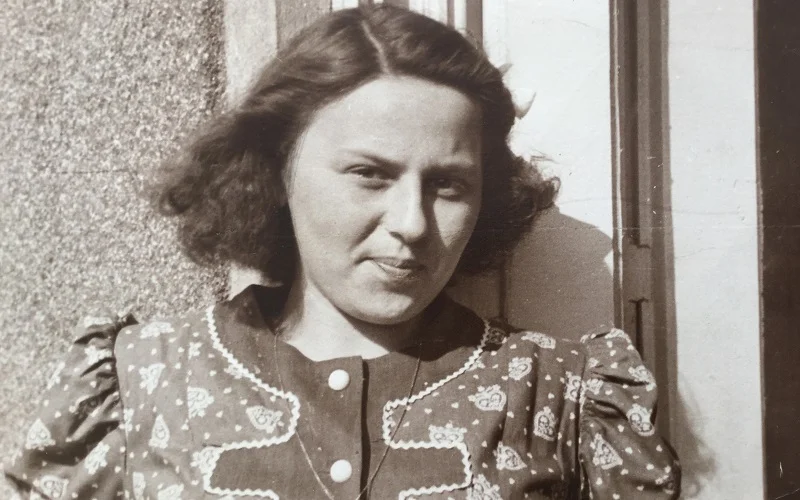Eva Haller is a Hungarian-American philanthropist, activist, executive and Board Member. She joined the Hungarian Resistance at age twelve to fight against the rising tides fascism and virulent antisemitism plaguing Europe.
When the German occupation of Hungary began in 1944, Eva was sent by her parents to the Scottish Mission in hopes she would be kept safely hidden amongst the students. They charged her with looking after the ten year old son of a family friend. When the Institute was later raided for hiding Jewish children Eva charmed a Nazi officer into sparing them both. Eva remained in hiding for the rest of the war and then later moved to New York.
Eva, a longtime member of The Common Good, sent us an interview to include with her story. Keep reading to hear her discuss her youth in the Hungarian Resistance, fleeing Nazi’s, and championing human rights across the world:
Who has shaped you as an activist and philanthropist?
When I first came to this country, I was as an illegal alien cleaning houses. Then I was no longer illegal because I got a student visa, but I was still cleaning houses. There were a couple of people who befriended me, and supported me, and believed in me.
I believe, very firmly, that the greatest gift you can give to another human being is to share with them the idea that you believe in them. That one-day they will be able to achieve what they are hoping to achieve.
Eva Haller meeting Malala Yousafzai
If anyone asks me, “What’s your identity?” I introduce myself as a mentor — and not as a philanthropist or not even as a social activist — because I have been mentored so well.
I have gotten so much from one friend in particular, her name is Joyce Edward, she’s 96. She’s a social worker; she has a PhD, and taught at Smith College. She not only believed in me, she pushed me to go to graduate school and become a social worker. She’s still proud of me. She’s eight years older than I am, still very beautiful, still very active, and she still believes in me.
The other friend was more on an equal basis. Barbara Pontecorvo, who’s about a year younger than I am. She took me in like a sister; she shared with me her parents so that I felt I had a home. I’m the godmother of Barbara’s three sons. I became part of that family.
Both Joyce and Barbara mentored me by the way they lived. I’m so grateful that the two women are such great women with such wonderful values.
I love my women friends. I cherish them, and I get a great kick out of them. I find it so difficult when I see some of these shrewd women who are against other women, or against the right of abortion and independence. It has to do with economics.
Eva Haller in India.
In India where some mother-in-law throws the daughter-in-law into a fire because by killing the bride, you get another bride with some more cows. Women can be very vicious to women.
Successful women have less to lose. If they are successful they can sit back and be far more generous.
In a society where we are not financially threatened by each other, our feminine values, when they come out, couldn’t be nobler and more wonderful and more supportive.
The most important part of life is validation. How do you validate yourself? It’s important to have a goal and a road map at any age, but it’s the most important to have one when you’re young. Once you’ve achieved something and you achieved it yourself, then you can move on from there because you have validated yourself to a certain point.
That still holds true when you’re 87 years old: Why are you going to get up next morning? What is the reason that you should be still here? That validation cannot come from anybody but you.
That is important because it keeps you working towards self-realization. But now, instead of worrying about how am I viewed, I can help someone else to view himself or herself.
What do you think is needed for social impact in the context of the current political climate? You have said that one thing people could do is to work to support the existing structures.
As a first step, people need to understand what those structures. They need to know what exists and what can be helped within what exists. Most people love to start new organizations because it’s an ego trip. We don’t need an ego trip right now.
The president is teaching us something enormously important. And that is, conventions haven’t worked. The most obvious next step in my mind is to re-examine all the ways we handled things before.
The institutional ways we have built this country are clearly not working. And there is this guy who is showing us that by defying all traditions, he is making a whole new way. Clearly caring about society, institutions, and order is not where he’s coming from. We should learn from the election that it is not a good idea to dismiss him.
You start by clearly examining what this man is doing. What are the steps he’s taking to destroy those things that we built up? Who are the people whom he has selected? What are good organizations we can support?
Here I remember, Ellen Malcolm, one of the IBM heirs, who decided to create Emily’s List. [Before Ellen Malcolm founded Emily’s List 30 years ago, no Democratic woman had ever been elected to the Senate in her own right.]
We have to understand that, even when you get to be 87, like me, social media is our most important weapon — if you know how to use it. I am on the Board of an organization called News Literacy Project (NLP).
It started nine years ago; it had a very hard beginning because nobody cared about it. Suddenly everybody is talking about fake news, “My god, young people have no idea where they get their news from.” They don’t know whether the news they believe is fake, half-fake, or half-baked.
Eva Haller as a young girl in Hungary
In Nazi Hungary there was no freedom of speech, and in Soviet-occupied Budapest there was no freedom of thought. In America today we desperately have to retain, maintain and encourage critical thinking and the courage of our convictions. Therefore, we must protect and grow the News Literacy Project, because news literacy is our most precious insurance against totalitarian slavery of thought
There was a piece about NLP on NPR the other day and the president of our board suggested that we put it on our Facebook page. I think we got 5,000 responses in one day. Yesterday we received $700,000 from the Emerson Collective in Silicon Valley. Our whole budget wasn’t that much! Change in a terrible direction and change in a good direction can happen very fast.
About the Author:
Eva Haller is a Hungarian-American philanthropist, activist, executive and Board Member. Notable positions include Board Chair of Free the Children, Trustee of the University of California, Santa Barbara, co-founder and President of the Campaign Communications Institute of America, Visiting Professor at Glasgow Caledonian University and the 2014 Magnusson Fellow.
A true American success story, Eva started out cleaning houses to support her passions and eventually earned her Masters Degree in Social Work. Since then she has: marched with Martin Luther King; co-founded the Campaign Communications Institute of America; volunteered for UNICEF in Southeast Asia; supported countless arts and cultural organizations with the proceeds of her successful company; worked as board member for News Literacy Project (NPL) and Board Chair of Free the Children.
Eva has earned many awards and honors throughout her life, some highlights of these include: 2011- Recipient of the Mandela Award for Humanitarian Achievement, Rubin Museum of Art, 2013 - Lifetime Achievement Award, United Nations Population Fund, 2013 - Inaugural Mentoring Award, Forbes Women’s Summit, 2014 - Awarded an Honorary Doctorate from Glasgow Caledonian University, 2015 - Awarded Luminary Status at the World Summit of Innovation and Entrepreneurship, and 2017 - Inaugural Ban Ki-moon Mentorship Award.
Sources:
Introduction and bio written and compiled by Isabel Wilson [TCG Intern]






